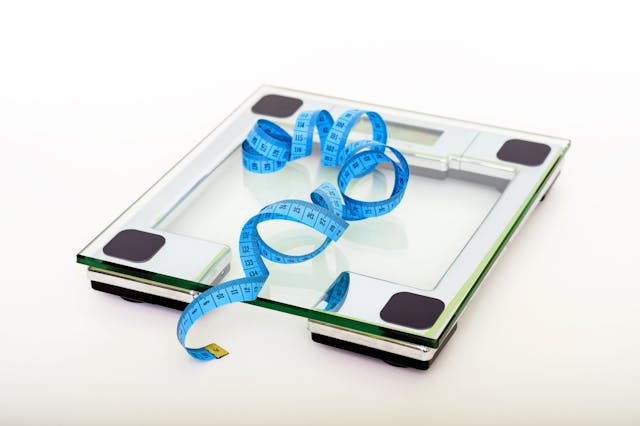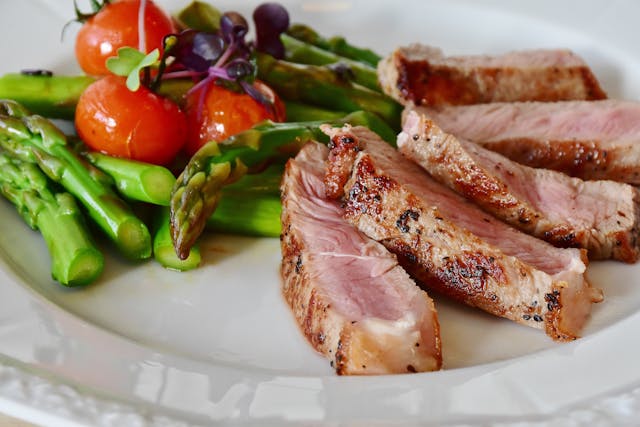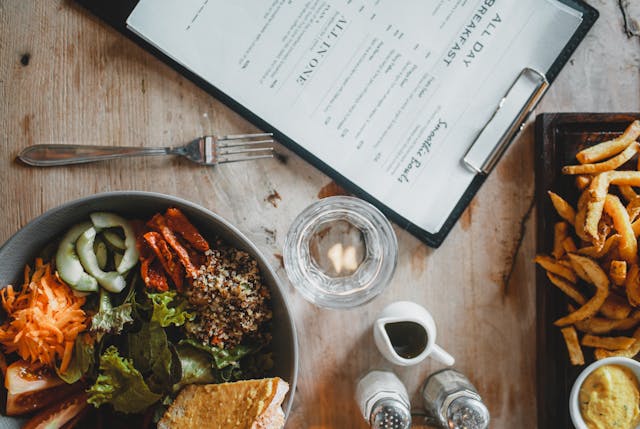Best Foods for Calorie Deficit: What You Need To Know
Embarking on a weight loss journey to achieve a calorie deficit can be truly transformative. However, it’s not without its hurdles. Individuals with heavy body weight striving for reduced calories often face common weight loss challenges. Thus, it put their dedication and resolve to the test. Sometimes, all it takes is to know a highly important trick. You will need to know the best foods for calorie deficit.
Let’s explore the transformative power of nutrition and learn how you can make informed choices for your calorie-deficit journey.

What Is a Calorie Deficit?
A calorie deficit happens when you consume fewer calories than your body uses in a day. This occurs when the calories burned through activities and bodily functions exceed those you consume during a specific period. Here’s how it works:
- Calorie Intake. Everything you eat and drink contributes to calories as your body digests and absorbs them.
- Calorie Expenditure. Your body utilizes these calories to maintain organs, healthy tissue, breathing, heartbeat, and all physical movements.
- Deficit. You create a deficit when you provide your body with fewer calories than it requires for these functions.
- Weight Loss. If you sustain a deficit consistently over extended periods, it can lead to weight loss.

How To Achieve Calorie Deficit for Weight Loss
Achieving a calorie deficit for weight loss involves mindful adjustments to your daily habits. Here’s a step-by-step guide:
- You Have to Determine Your Baseline. Understand your current calorie needs based on metabolism, health, muscle mass, and activity level.
- You Have to Set Realistic Goals. Aim for a calorie deficit of 300-700 calories per day. A deficit within these values promotes a safe rate of weight loss at about 0.5-1.5 pounds per week. Avoid doing drastic weight loss methods!
- You Have to Make Dietary Adjustments. Focus on eating nutrient-dense foods and consider portion control to reduce calorie intake.
- You Have to Increase Physical Activity. Incorporate regular exercise into your routine to boost calorie expenditure. This includes walking, jogging, cycling, or strength training.
- Listen to Your Body. Pay attention to hunger and energy levels. While a calorie deficit is essential for weight loss, it’s crucial to strike a balance that supports your overall well-being.
- Individualize Your Approach. Recognize that there’s no one-size-fits-all solution. Factors such as activity levels, chronic health conditions, genetics, and lifestyle habits vary among individuals. These factors greatly influence the effectiveness of a caloric deficit. Thus, adjust your approach accordingly.
Remember, consistency is key. We advise you to consult with a healthcare professional or nutritionist. You must ensure your weight loss plan aligns with your unique needs and health considerations.

Best Foods for a Calorie Deficit: What Are the Criteria?
Consider the following criteria when choosing the best foods for a calorie deficit. That way, you can ensure not only effective weight loss but also overall health and well-being:
- It Should Be Low in Calories
Opt for foods that are naturally low in calories. This allows you to consume satisfying portions without exceeding your daily calorie limit.
- It Should Be Rich in Nutrients
Prioritize nutrient-dense foods that pack a punch in essential vitamins and minerals. These nutrients are crucial for various bodily functions. That way, you ensure your body operates at its best while working towards weight loss.
- It Should Be High in Fiber
Choose foods with lots of fiber to enhance feelings of fullness and satiety. Fiber not only supports digestive health but also curbs the temptation to overeat.
- It Should Contain Lean Proteins
Include foods with lean proteins in your diet. These protein sources, such as poultry, fish, tofu, and legumes, can aid in preserving muscle mass during weight loss. This is also essential for maintaining overall strength and metabolic health.
- It Should Include Healthy Fats
While moderation is key, incorporate foods with healthy fat. These fats contribute to a sense of satisfaction. It also makes it easier to stick to your deficit without feeling deprived.

Best Foods To Eat for Calorie Deficit: The List
Selecting foods that are both nutrient-dense and low in calories is crucial. Here’s a curated list of the best foods to eat for calorie deficit that align with these principles:
Green Vegetables
Green vegetables, such as broccoli, spinach, and kale, are packed with fiber and essential micronutrients. They promote a feeling of fullness without adding many calories to your daily intake.
Whole Grains
Instead of white rice, opt for whole grains like quinoa, brown rice, and oats. That is rich in fiber and lower in sugar. These nutrient-dense grains support a lower-calorie diet and contribute to a reduced risk of diabetes and improved heart health.
Fresh Fruits
Enjoy a variety of fresh fruits, such as berries, apples, and citrus fruits. Beyond providing essential micronutrients, fruits are filling due to their high fiber and water content.
Lean Proteins
Include protein-rich foods like poultry, fish, tofu, egg whites, and legumes in your diet.
Low Fat or Fat-Free Dairy
Add dairy products like milk, yogurt, cheese, or fortified soy beverages. These items offer a combination of protein and calcium. It can contribute to overall nutritional needs while helping you manage calorie intake.
Healthy Fats
Integrate sources of healthy fats such as avocados, nuts, seeds, and olive oil. These foods provide essential fatty acids and nutrients.

Best Foods for Calorie Deficit: What To Avoid?
Besides discussing the best foods for calorie deficit, let’s talk about what you should avoid.
When aiming for a deficit, avoid high-calorie or nutritionally lacking foods. Opt for nutrient-dense choices to support your goals. Here’s a list to be mindful of:
- French Fries and Potato Chips. High in calories and fat, excessive consumption can lead to weight gain and obesity due to their processed nature.
- Sugary Drinks. Sugar-sweetened beverages, including sodas and sweetened juices, can significantly contribute to excess calorie intake.
- White Bread. Highly refined white bread typically lacks essential nutrients. Plus, they often contain added sugars! It has a high glycemic index, which can lead to quick spikes in blood sugar levels.
- Alcohol. Alcoholic beverages are calorie-dense, and their consumption can impede weight loss efforts. Consider limiting alcohol intake or opting for lower-calorie choices.
- Ice Cream. While it is a delightful treat, most ice creams are also packed with calories, sugars, and fats.
- Condiments and Sauces. Popular condiments like ketchup, mayonnaise, and certain sauces can add significant calories to your meals.
- Baked Goods and Pastries. Pastries, cakes, and doughnuts are rich in calories and unhealthy fats.
- Candy and Sweets. Candies, chocolates, and other sweet treats are high in calories and lack essential nutrients.
- Processed Meats. Certain processed meats, such as sausages and hot dogs, are high-calorie foods with unhealthy additives.
- High-Calorie Coffee Drinks. Flavored coffees with added syrups, whipped cream, and sugary toppings can turn a simple coffee into a high-calorie beverage. Opt for black coffee or choose healthier alternatives.
Best Fast Food for Calorie Deficit: What To Choose When Dining Out?
Choose fast-food options that align with your goal. So, you must prioritize lower-calorie selections with nutritional value when dining out. Here are some examples of healthier options and the best fast food for calorie deficit:
Grilled Options
Grilled foods are lower in calories compared to fried or heavily processed options. Here are some grilled food ideas you can look for when dining out.
- Grilled Chicken Sandwich
- Choose a grilled chicken sandwich instead of a crispy or breaded one.
- Opt for whole grain or whole wheat buns when available.
- Grilled Chicken Wraps
- Look for wraps with grilled chicken, vegetables, and whole-grain tortillas.
- Fish Tacos
- Opt for fish tacos with grilled fish, cabbage slaw, and a light dressing.
- Avoid fried options and heavy sauces.
- Grilled Chicken Salad
- A simple grilled chicken salad with various vegetables can be a nutritious choice.
Burger Alternatives
Veggie burgers are a choice for health-conscious individuals or those looking to reduce meat consumption. They are typically lower in saturated fats and calories than traditional beef burgers.
- Veggie Burgers
- Consider veggie or plant-based burgers for a lower-calorie option.
- Pay attention to the condiments and toppings to keep it healthier.
Salads
Salads offer a nutrient-dense and low-calorie option for individuals in a calorie deficit. More veggies will promote satiety and overall health.
- Salads with lean protein
- Choose salads with lean protein, like grilled chicken or shrimp.
- Be cautious with dressings—opt for vinaigrettes or request dressings on the side.
Lighter Choices
Lighter choices like yogurt parfaits and smoothies are ideal for a calorie deficit. They offer lower-calorie options with nutritious ingredients.
- Yogurt Parfait.
- Some fast-food places offer yogurt parfaits with fruit and granola.
- Smoothies
- Choose smoothies with real fruit, low-fat yogurt, and no added sugars.

Quick Tips for Achieving a Calorie Deficit
To aid you in achieving a healthier lifestyle and effective weight management, remember these tips:
- Utilize a food diary or tracking app to monitor daily calorie intake.
- Pay attention to portion sizes and savor each bite to prevent overeating.
- Ensure sufficient sleep to avoid disruptions in hunger hormones and prevent increased calorie intake.
- Integrate physical activity to burn calories and aid in weight loss.
- Drink water before meals to curb hunger and reduce additional calorie consumption.
- Prioritize nutrient-dense, whole foods for improved nutrition.
- Plan and prep meals in advance for easier adherence to healthier choices.
- Cut down on sugary snacks and beverages to reduce empty calorie intake.
- Opt for nutritious snacks and be mindful of snacking patterns for better control over daily calorie intake.

Best Foods for Calorie Deficit Reddit: Their Favorite Thing To Eat
In this friendly thread, people share the best foods for calorie deficit on Reddit. People talked about their breakfast choices, like yogurt with fruit protein-packed lunches and diverse dinner options. Individuals are also exchanging personal preferences and strategies for staying full and satisfied. Some have also emphasized the importance of mindful eating, portion control, and incorporating protein-rich snacks.

Best Foods for a Calorie-Deficit Diet
Embarking on a weight loss journey comes with its fair share of struggles. But with awareness and planning, you can overcome these challenges by knowing the best foods for calorie deficit.
Discover how ModernFit can assist you with weight loss by providing tailored plans, guidance, and a supportive community. Your health transformation starts here with ModernFit—where modern approaches meet lasting results!


